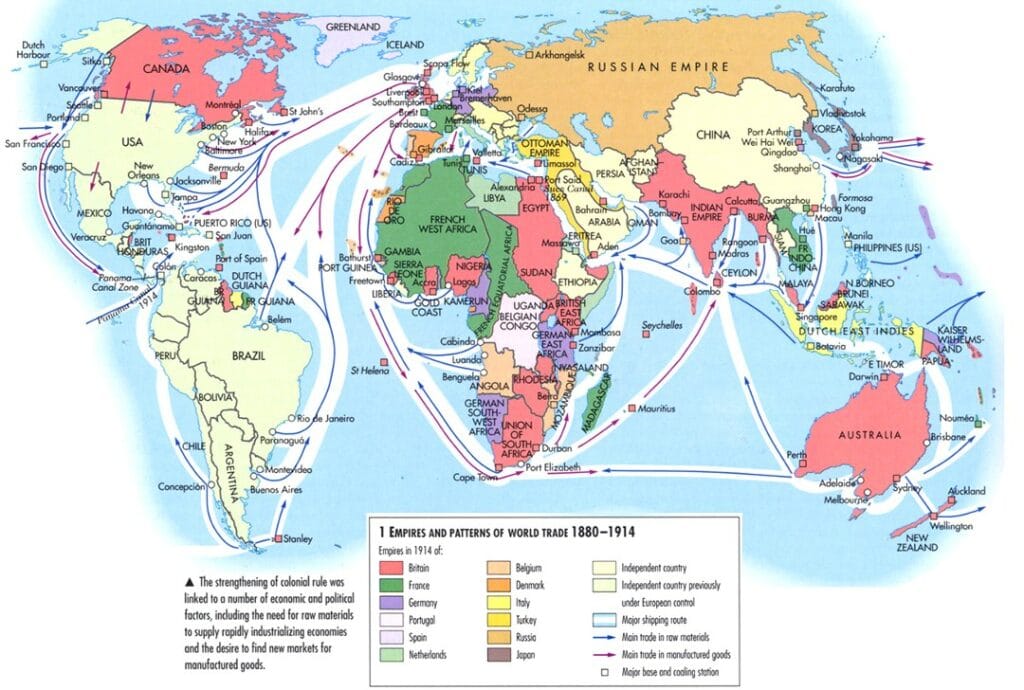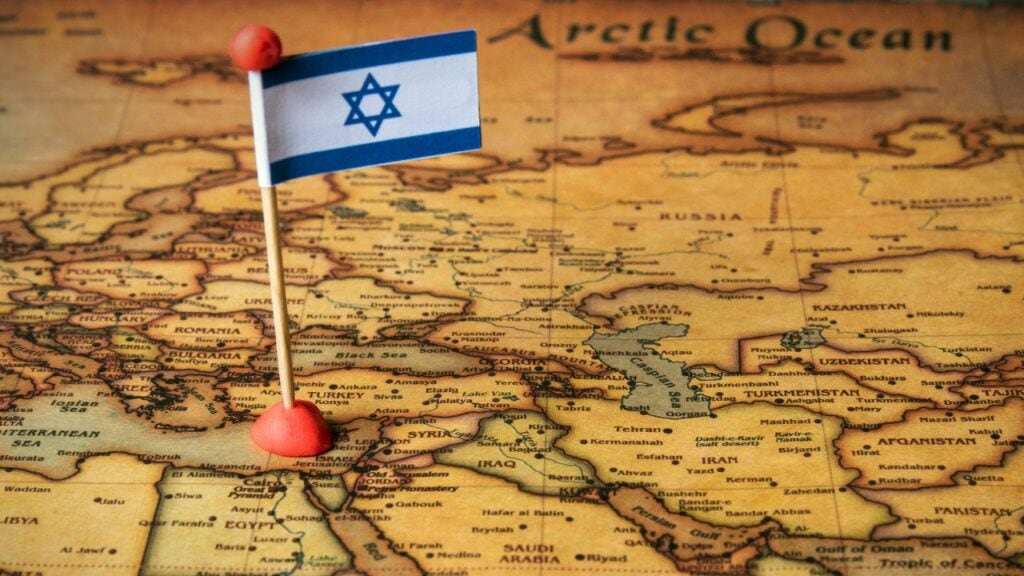Colonialism is one of the most common accusations against Israel. When faced with this accusation, many Israelis usually reply with one or both of the following counter arguments.
The first counter argument is that Jews are indigenous to the land of Israel and therefore cannot be colonizers, no more so than Native Americans, the Māori, or any other aboriginal population. The second one is that the Jews who came to the land didn’t do it in the name of any colonial power. They were not shipped off by some ruler, nor did they wear any uniform or sail under one flag. In fact, they came from different places, spoke different languages, wore different clothes, and paid different money for a ticket that cost them most of what they had.
While each argument has its own merit, neither of them is very effective against people who deny the connection between Jews and their ancestral land in the first place, or view Israel as an extension of The West who’s simply using it to have a foothold in the region. In my experience, the second argument usually works a little better, especially when you mention it was actually the Jewish resistance who eventually forced the colonial British forces out of Palestine.

However, both these counter arguments ignore one key aspect of colonialism. An aspect that really makes a difference – especially in the mind of the young liberal post-Modern Marxist type. Can you guess what it is?
The definition of colonialism
A quick google search for “colonialism definition” will tell you that Oxford Languages defines colonialism as follows:
The policy or practice of acquiring full or partial political control over another country, occupying it with settlers, and exploiting it economically.
In this article I want to focus on the ‘exploiting’ part of the definition and use that to answer the question of whether or not Israel is a colonial state. Because when it comes to terms like ‘country’, ‘occupation’, ‘settlers’ and even ‘political control’, which are charged even more than usual in the contexts of the Israeli-Arab conflict, it is very hard to get somewhere when debating this issue. Especially since some definitions have been tampered with.
However, this is not the case with the last part of the definition – economic exploitation. That’s because economy doesn’t deal with words – it deals with numbers, which are far more concrete and conclusive. Numbers can tell a story just as well as words, and sometimes even better.
This is actually reflected both in Hebrew and in English. In Hebrew, the word for number מִסְפָּר (mispar), the word for story סִיפּוּר (sipur), and the word for book סֶפֶר (sefer) are all based on the shoresh ס-פ-ר (Samekh-Peh-Resh). In English, we have the words ‘account’ and ‘recount’ which not necessarily involve actual counting with numbers.
Exploitation and the flow of resources
Colonialism is a form of exploitation that doesn’t occur between individuals, but between whole states and nations. And when we talk about the imperialist colonialism of the 19th century, it can even be regarded as exploitation on a continental scale. Nothing proves this point better than the global trade routes that have evolved as a result of colonialism.

Calling it trade routes is quite dishonest for two reasons. The first reason is that the word ‘trade’ implies a mutual and fair exchange of items between two consenting parties. The second reason is that for the most part, the actual trade was done off these routes, and only after the goods were unloaded from the ships at the ports of the Old World. Before that point, it was more of a robbery than actual trade.
Precious minerals, wood, fabric, fur, agricultural produce, exotic artifacts, and every other type of resources you can imagine, were all traded as commodities in the Old World, but that was only after they were taken from the New World. And that wasn’t even the worst part. The worst part was that human beings were also treated as commodities in the form of slavery.
The bottom line is that under colonialism, the flow of resources was one-directional, and that direction is from the place that is colonized to the place doing the colonizing. I don’t think there’s anyone who would argue with that.
Donation Nation
There are many things you can debate about when it comes to Zionism and the reestablishment of the state of Israel. We could argue all day about history, geography, theocracy, justice, morality, and the list goes on. But one thing is objectively certain regardless of which narrative you subscribe to – Jewish resources were poured and funneled from different parts of the world into the Holy Land and not the other way around. That is pretty much the opposite of colonialism.
How do I know that Jewish resource poured into Palestine and not drained out of it? Putting aside the fact that this tiny piece of land had very little resources to begin with, there is one item that encapsulates the flow of resources under Zionism, and that is this little blue box:

This is a donation box of the Jewish National Fund – an organization founded during the fifth World Zionist Congress in 1901, with the sole purpose of collecting donations in order to buy and develop land in the Land of Israel. For decades, boxes similar to this one could be found at almost every Jewish home, school, synagogue, as well as many businesses in the Jewish Diaspora. Men and women, young and old – all put small change in it to do their part in supporting the Jewish communities in the Land of Israel and help them grow and develop.
Apart from the direction of the flow of resources under Zionism, these boxes reveal one other very important fact. They tell us that prior to the Arab hostilities and the war of 1948, the Jews who settle in Palestine didn’t steal any land, nor did they take it by force. Instead, everything was bought and paid for – fair and square. In fact, it is estimated that by 1948 the Jewish National Fund had purchased over 900,000 dunam of land, which are roughly 1,000 square kilometers or 240,000 acres. This of course doesn’t include Jewish private ownership.
In Hebrew the Jewish National Fund is called קֶרֶן קַיֶּימֶת לְיִשְׂרָאֵל (keren kayemet le’israel), but it is usually referred to in the abbreviated form קק”ל which is pronounced kakal. The organization is still active in Israel but now its main focus is forestation and the maintenance of national parks and scenic spots all over the country.
Colonialism Vs Migration
I think it’s fair to say that regardless of the fact that Palestine was their ancient homeland, Jews moved to Palestine in search for a better and safer future, for themselves and for their family. They were not sent by anyone but instead chose to sell everything and relocate to a place which was new to them, yet also the object of a very old dream. That doesn’t make them colonizers – it simply makes them immigrants.
If Jews are colonizers then the same goes for any immigrant and maybe even refugee in the world. In fact, from the point of the flow of resources, it applies even more to immigrants and refugees because many of them send money and gifts back to the place from which they came.
The colonization of Wikipedia
While doing research for this post, I came across different definitions of colonialism. The worst one by far was that of Wikipedia, which is clearly colonized by far left post-Modern ideologs. Here is the first paragraph of the entry and let’s see if you can spot the two colonies.
Colonialism is a practice by which a one group of people, social construct, or nation state controls, directs, or imposes taxes or tribute on other people or areas, often by establishing colonies, generally for strategic and economic advancement of the colonizing group or construct. There is no clear definition of colonialism; definitions may vary depending on the use and context.
The small colony is the vague term ‘social construct’ which ironically is one of the go-to expressions for anyone who seeks to deconstruct and destruct a society rather than building something and be constructive. The larger colony is the last two sentences ending the paragraph claiming that “there is no clear definition” for colonialism and that it “depends on the context”. With “depending on the context” you can pretty much justify anything, even legitimizing calls for genocide against Jews as we have seen recently.
Blurring definitions and denying distinctions are two of the most efficient ways to make people less intelligent, and that is exactly the purpose of whoever wrote the paragraph above, whether he or she is aware of that or not. By the way, as the video below demonstrates, it is already a well-known fact that Wikipedia leans heavily towards the left.
That is why I took their advice and also stopped donating. I also try to keep the number of links directing to Wikipedia as low as possible on this blog, especially when it comes to politics.
Stay in Touch!
Get the next post from Hebrew Monk directly to you inbox!
Don't like emails? Subscribe to Heberw Monk's Telegram Channel instead.



